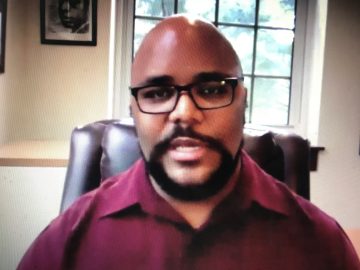By DAVID DUPONT
BG Independent News
English Professor McKinley Melton knew that as keynote speaker for the Day of Dialogue at Bowling Green State University, he would be expected deliver a hopeful message.

“Problem is I haven’t felt terribly hopeful these days,” he said speaking from Gettysburg College in Pennsylvania to his virtual audience a couple weeks ago. “The state of affairs in this country, indeed in our world in 2020, is not one that inspires a lot of hope . If anything, I felt consistently stymied by an almost equal measure of frustration, fear, and fatigue. Like many of you I’m sure I find myself enraged by the daily news.”
The causes are many:
The rise of authoritarian figures
Domestic leaders who fail to address historic inequities and their manifestation in the current pandemic.
The constant roll call of hash tags honoring the victims of police violence and state sponsored violence.
The barrage of reports of sexual violence.
The realization that the only reason that mass shootings in schools and elsewhere have stopped is because of the pandemic. Each of these shootings prompted an expected cycle of “wash, rinse, and repeat” accompanied by “thoughts and prayers and never policy and legislative change.”
So, Melton did as he always does when feeling unenthusiastic about the work ahead, he turned to his bookshelf.
There he found the poetry of Gwendolyn Brooks, and her poem, “The Chicago Defender sends a man to Little Rock – fall, 1957.”
In the poem, he found the line: “It is our business to be bothered.” In the line, he found the theme for a keynote address almost as tightly wound and woven as the testimony of the poets and activists he summoned as witnesses to support his case.
He included Julian Bond – not being able to resist a photo of himself and the activist and Jennifer McCary, now chief diversity and belonging officer at BGSU – as well as the recently deceased John Lewis and his admonition to “get into good trouble, necessary trouble.”
These men were driven to fight against injustice, Melton said, in part by the lynching of their peer Emmett Till.
So, too, Melton said, should college students be roused to act by the memory of Tamir Rice, the Cleveland child who was shot while playing with a toy gun in a public park.
If he’d lived, Rice would be 18.
“See yourselves in his story,” Melton said. “Consider his humanity when you reflect on your own. It is our business to be bothered.
Activist Ella Baker said: “Until the killing of black men, black mothers’ sons, becomes as important to the rest of the country as the killing of a white mother’s son, we who believe in freedom cannot rest until this happens.”
Melton also included a close reading of Martin Luther King Jr.’s “Letter from a Birmingham Jail.”
In response to local clergymen who, while saying they supported his cause, decried his actions, King responded that the peace they accused him of disturbing was built on inequality.
To their pleas for patience, King responded: “’Wait’ almost always meant ‘never.’”
He urged students “to work tirelessly to compel change.”
He concluded with a poem from 2016 by Danez Smith.
The poem “Principles,” Melton said, reflects “the search of hope in the face seemingly insurmountable odds.”
Smith urges: “Let us not be idle or stunned by fear.”
It’s best, Melton said, to think of Smith and the others he referenced in his talk as agitators.
To be bothered, Melton concluded is “to translate frustration into action and action into transformation.”
***
Melton’s keynote is available on YouTube as is the Day of Dialogue in its entirety.

